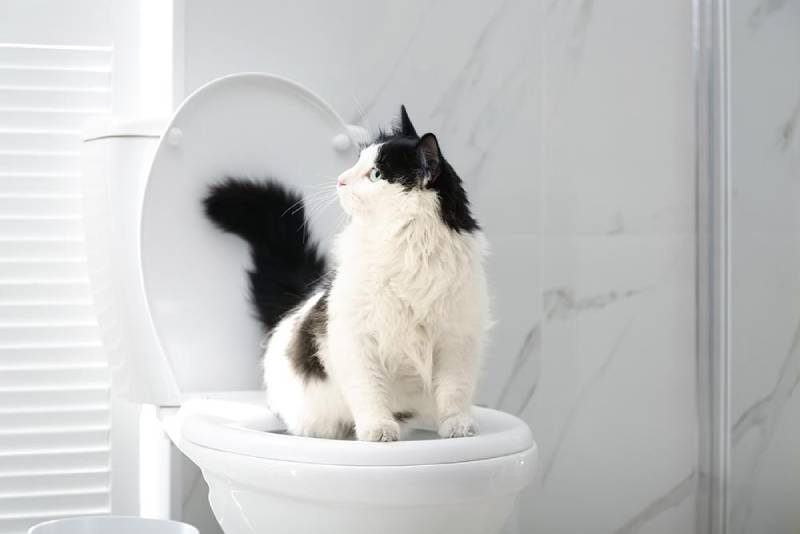Prevent Clogs and Damage: Never Flush Cat Poop Down Your Toilet - Expert Recommendations
Prevent Clogs and Damage: Never Flush Cat Poop Down Your Toilet - Expert Recommendations
Blog Article
What are your opinions with regards to Can You Flush Cat Poo or Litter Down the Toilet??

Intro
As pet cat owners, it's vital to bear in mind exactly how we dispose of our feline friends' waste. While it might appear convenient to flush pet cat poop down the bathroom, this method can have damaging consequences for both the atmosphere and human health and wellness.
Alternatives to Flushing
Fortunately, there are much safer and a lot more responsible means to take care of pet cat poop. Think about the following alternatives:
1. Scoop and Dispose in Trash
The most common method of disposing of pet cat poop is to scoop it right into a naturally degradable bag and throw it in the trash. Be sure to utilize a specialized trash inside story and take care of the waste promptly.
2. Use Biodegradable Litter
Choose eco-friendly feline trash made from materials such as corn or wheat. These litters are eco-friendly and can be securely disposed of in the garbage.
3. Hide in the Yard
If you have a backyard, take into consideration hiding feline waste in a designated location away from veggie yards and water resources. Make certain to dig deep adequate to avoid contamination of groundwater.
4. Install a Pet Waste Disposal System
Purchase a pet dog waste disposal system specifically made for pet cat waste. These systems make use of enzymes to break down the waste, decreasing smell and environmental influence.
Wellness Risks
Along with environmental problems, purging feline waste can also posture wellness risks to human beings. Feline feces may contain Toxoplasma gondii, a bloodsucker that can trigger toxoplasmosis-- a potentially severe illness, especially for expecting ladies and individuals with damaged body immune systems.
Ecological Impact
Purging cat poop presents damaging virus and bloodsuckers into the water supply, posing a significant risk to aquatic ecosystems. These pollutants can adversely impact aquatic life and concession water high quality.
Conclusion
Liable pet dog ownership expands past offering food and sanctuary-- it likewise involves appropriate waste administration. By refraining from flushing feline poop down the commode and going with alternative disposal methods, we can lessen our ecological impact and protect human wellness.
Why Can’t I Flush Cat Poop?
It Spreads a Parasite
Cats are frequently infected with a parasite called toxoplasma gondii. The parasite causes an infection called toxoplasmosis. It is usually harmless to cats. The parasite only uses cat poop as a host for its eggs. Otherwise, the cat’s immune system usually keeps the infection at low enough levels to maintain its own health. But it does not stop the develop of eggs. These eggs are tiny and surprisingly tough. They may survive for a year before they begin to grow. But that’s the problem.
Our wastewater system is not designed to deal with toxoplasmosis eggs. Instead, most eggs will flush from your toilet into sewers and wastewater management plants. After the sewage is treated for many other harmful things in it, it is typically released into local rivers, lakes, or oceans. Here, the toxoplasmosis eggs can find new hosts, including starfish, crabs, otters, and many other wildlife. For many, this is a significant risk to their health. Toxoplasmosis can also end up infecting water sources that are important for agriculture, which means our deer, pigs, and sheep can get infected too.
Is There Risk to Humans?
There can be a risk to human life from flushing cat poop down the toilet. If you do so, the parasites from your cat’s poop can end up in shellfish, game animals, or livestock. If this meat is then served raw or undercooked, the people who eat it can get sick.
In fact, according to the CDC, 40 million people in the United States are infected with toxoplasma gondii. They get it from exposure to infected seafood, or from some kind of cat poop contamination, like drinking from a stream that is contaminated or touching anything that has come into contact with cat poop. That includes just cleaning a cat litter box.
Most people who get infected with these parasites will not develop any symptoms. However, for pregnant women or for those with compromised immune systems, the parasite can cause severe health problems.
How to Handle Cat Poop
The best way to handle cat poop is actually to clean the box more often. The eggs that the parasite sheds will not become active until one to five days after the cat poops. That means that if you clean daily, you’re much less likely to come into direct contact with infectious eggs.
That said, always dispose of cat poop in the garbage and not down the toilet. Wash your hands before and after you clean the litter box, and bring the bag of poop right outside to your garbage bins.
https://trenchlesssolutionsusa.com/why-cant-i-flush-cat-poop/

I recently found that entry on Can You Flush Cat Poop Down The Toilet? while doing a lookup on the web. Do you know anybody else who is inquisitive about the niche? Why not share it. Thank-you for going through it.
Schedule A Service Report this page